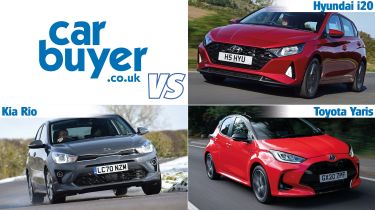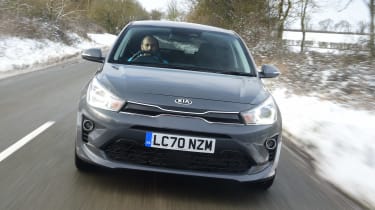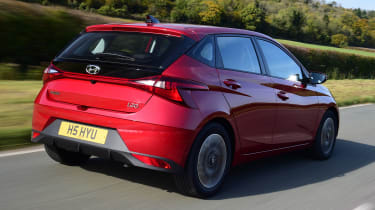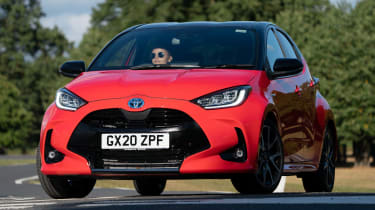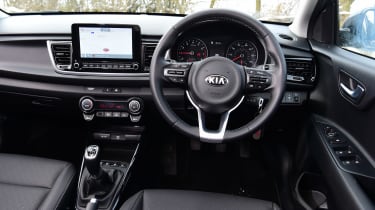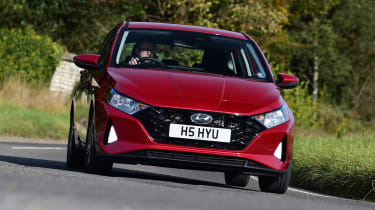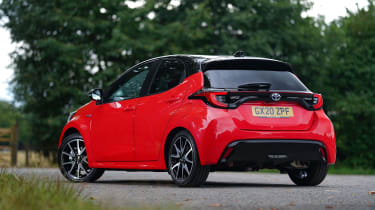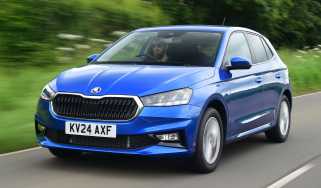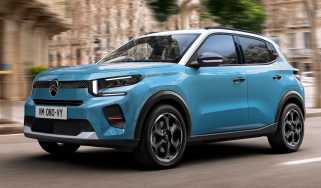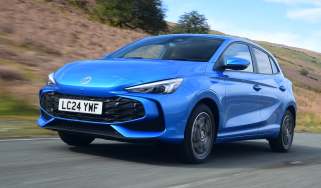Hyundai i20 vs Kia Rio vs Toyota Yaris: which should you buy?
Find out which of these top superminis is right for you with our in-depth three-way comparison
While small SUVs and compact crossovers may have stolen their thunder a bit, humble superminis remain a preferred pick for many new car buyers. The supermini remains one of the most popular types of car in the UK, which unsurprisingly means the manufacturers offer plenty of options if a small hatchback fits the bill for you.
For this supermini comparison, we’re looking at the Kia Rio, Hyundai i20 and Toyota Yaris. While they don’t fly out of dealership showrooms as quickly as some other rivals like the Vauxhall Corsa, Ford Fiesta and Volkswagen Polo, the three small hatchbacks here are still strong sellers, and are definitely worth bearing in mind if you’re shopping around for a new supermini.
 The best small cars and superminis in 2025
The best small cars and superminis in 2025
All three cars bring to the table their own strengths and weaknesses – some have the edge in areas like affordability and refinement, whereas others are better to drive and are nicer to spend longer journeys in. What the trio we’ve assembled all do is tick a lot of boxes to a good standard, making them solid picks for prospective small hatchback owners who may be considering one of the better known options.
In this article, we’ll take a closer look at the Toyota Yaris, Hyundai i20 and Kia Rio, and find out what each of these models’ respective strengths and weaknesses are.
Which is the best to drive?
In their older incarnations, neither the Hyundai i20, Kia Rio or Toyota Yaris were renowned for the way they drove, though things have changed for the most part with these current versions. The Hyundai i20 in particular has seen a big transformation: whereas its predecessor was competent if bland to drive, the current car has better body control when cornering, sharper steering responses and overall feels planted on the road. It’s not quite as fun as class leaders like the Ford Fiesta, but the i20 isn’t that far off.
Likewise, the Toyota Yaris is also now a car that feels far more composed than the model it replaces. While not as precise or as fun as the Hyundai, the Yaris nevertheless is impressively smooth and responsive around town or on faster roads. Factor in the refinement and ease-of-use of the automatic-only hybrid powertrain, and the Toyota is quite relaxing and refined by supermini standards.
In comparison with its fresher-faced peers, the Kia Rio (which first went on sale back in 2017), doesn’t quite hold up as well. Neither smooth nor firm and with a competent-if-not-engaging handling setup, the Kia Rio covers a number of bases, but doesn’t especially excel in any one area. It’s fine and capable enough to deal with day-to-day driving duties, though you may want to look elsewhere if you’d prefer a supermini that places more of an emphasis in areas like comfort, refinement or sportiness.
Which is the cheapest to run?
If you’re looking to save on your fuel costs and predominantly spend your behind-the-wheel time around town, then the Toyota Yaris will probably be the best supermini for you from our selection here. According to Toyota, the hybrid-only Yaris can return up to 68.8mpg, thanks in large part to the electric motor that can give the engine extra assistance under acceleration. Depending on how much charge is in the battery, the Yaris is also capable of covering very short distances on electric power alone.
In contrast, the Hyundai i20 and Kia Rio aren’t as economical, though they are capable of returning good efficiency figures. This is especially true on the models using the 1.0-litre mild-hybrid petrol engine – with this powertrain under the bonnet, Hyundai quotes a maximum fuel economy figure of 55.4mpg for the i20, and Kia up to 54.3mpg for the Rio. In contrast, the non-hybrid 1.0-litre petrol (up to 52.3mpg) and 1.2-litre petrol (up to 53.3mpg) aren’t quite as impressive.
On the CO2 emissions front, the Toyota Yaris again has the advantage over its Hyundai and Kia rivals – albeit not a huge one. Emissions for the Yaris vary from 92g/km to 112g/km, so the first-year tax bill ranges from £140 to £180 depending on the spec. Because the Hyundai has a narrow spread of emissions (116g/km to 121g/km), all versions will cost £180 to tax for the first year, as does the Kia Rio (118g/km to 125g/km, depending on the engine and spec). With the first year's tax usually included in the price of the car, these CO2 emissions will be more useful for company-car drivers looking to work out their Benefit-in-Kind tax costs.
For the lowest insurance premiums, though, it may be the Kia Rio that’s worth going for. Insurance groups for this model range from group 4 for the entry-level 1.2-litre petrols, to group 9 for the 1.0-litre mild-hybrid GT-Line S cars. In contrast, the Hyundai i20 goes from insurance group 12 for entry-level SE Connect cars to group 16 for the N-Line and Ultimate trims, whereas the Toyota Yaris goes from insurance group 13 in Icon trim to group 14 for all other grades.
Which has the best interior?
Despite being one of the older cars in its class, the Kia Rio still holds up relatively well in the interior stakes – no doubt helped by the light refresh as part of the car’s facelift in 2020. While there are some scratchy plastics in the cabin and not all of the more interesting tech is available across the range (entry-level cars do without the seven-inch touchscreen, for instance), the Kia Rio nevertheless feels solidly put together and comes with enough creature comforts to suit most buyers’ needs.
Being more recent arrivals on the new car scene, the Toyota Yaris and Hyundai i20 do feel that bit more contemporary inside, thanks to the more minimalist control layouts on the dashboard and touchscreen infotainment systems across the range with built-in smartphone integration. Overall fit-and-finish feels a bit better here than in the Kia, too – though, like the Rio, the Hyundai i20 and Toyota Yaris do have their fair share of cheaper-feeling plastics dotted throughout the cabin. Plus, none of the cars here are exactly the standard bearers for exciting dashboard design – you’ll need to look elsewhere for a supermini that brings to the table a stylish interior.
Which is the most practical?
Being small cars, none of the superminis here are the last word in roominess and practicality. That said, considering their size, neither the Toyota Yaris, Hyundai i20 or Kia Rio are especially cramped inside, though there are areas where particular cars here have a noticeable advantage over the others.
This is perhaps most obvious with regards to boot space. Perhaps surprisingly, considering it’s the oldest car in this line-up, the Kia Rio has a handily large boot – at 325 litres, it’s one of the roomier superminis on sale right now, and isn’t too far off what bigger family hatchbacks, like the Kia Ceed or the Ford Focus, can muster. In contrast, the Toyota Yaris has a less impressive cargo capacity of 286 litres, though part of that is due to the way the battery pack for the hybrid powertrain is packaged in the car.
With regards to the Hyundai i20, the boot size can vary quite a bit depending on which version you go for. Opt for a car with a mild-hybrid engine option and, as a result of the way the battery is positioned underneath the boot floor, there’s just 262 litres of storage space on offer, which is on par with what many smaller city cars are capable of. In contrast, Hyundai i20 models that go without the mild-hybrid tech see their boot capacities grow to a more impressive 352 litres.
Up front, there’s plenty of room for the driver and the passenger riding shotgun, and by the standards of the class there’s a decent amount of room, too. However, while the Hyundai is by a whisker the best in this regard of the three cars here, all of them are a bit restrictive for rear seat leg room, so taller passengers may be left wanting for space. Head room is more respectable across the board, though the sloping roofline on the Toyota does mean six footers won’t have much head clearance in the Yaris.
Which should you buy?
By virtue of being by some margin the oldest of the three cars here, the Kia Rio does feel a bit more dated in comparison with the Toyota Yaris and Hyundai i20. Not all models get the latest kit, for instance, and while it covers a lot of bases to a good standard there are few areas where the Rio excels. That said, in this company, the Kia Rio does appeal with its sizeable boot and theoretically more competitive insurance premiums thanks to its low insurance group ratings. Plus, the Kia Rio is by some margin the most affordable car here, with like-for-like versions of the Yaris and i20 tending to be a few thousand pounds more expensive.
It's the Toyota Yaris that sits at the top of the price lists in this company, though the extra costs are offset in part by the car’s superior on-paper efficiency. The lowest emissions here mean the Yaris is a bit more affordable to tax in most cases than the Kia or Hyundai, and the hybrid powertrain means it should be much more economical for drivers who spend most of their time nipping around towns and cities. Because it’s only available with a CVT automatic gearbox, it’s also very easy and straightforward to drive.
Lastly, the Hyundai i20 will win some brownie points from drivers who want a supermini that’s striking to look at, and the sharper handling over the outgoing model means this gen of i20 will appeal to buyers looking for something fun to drive, too. Equipment levels are also pretty good, and the i20 also has the biggest boot of our trio of superminis (provided you opt for a model without the fuel-saving mild-hybrid tech).
Read our guides to the best small SUVs and the best used small cars.
Recommended

SEAT releases new Black Edition models with sportier styling
Most Popular

New Smart #5 Brabus is a 637bhp far cry from the brand’s city car past

Best car leasing deals 2025: this week’s top PCH offers
Tips & advice

Car dashboard warning lights: what does each symbol mean?

Electric car charging stations: public networks, charger types, apps and maps

